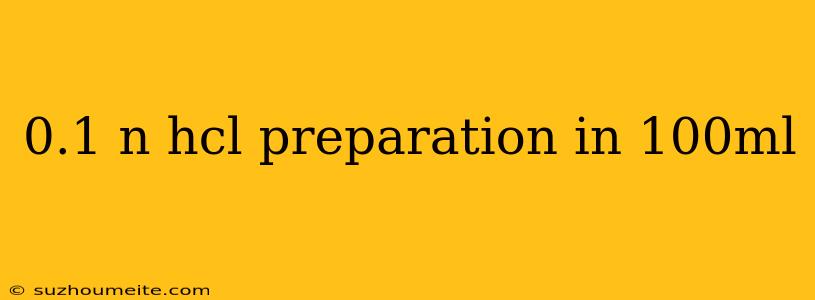Preparation of 0.1 N HCl in 100ml
Introduction
Hydrochloric acid (HCl) is a strong acid commonly used in various laboratory applications, including titration, acid-base reactions, and sample preparation. In this article, we will outline the step-by-step procedure for preparing 0.1 N (normal) HCl in 100ml.
Materials Required
- Concentrated hydrochloric acid (HCl) (37% or 12 M)
- Distilled water
- Volumetric flask (100ml)
- Pipette
- Calculator
Preparation
Step 1: Calculate the Volume of Concentrated HCl Required
To prepare 0.1 N HCl, we need to calculate the volume of concentrated HCl required. The normality of an acid is defined as the number of equivalents of the acid per liter of solution. For HCl, the equivalent weight is 36.46 g/mol.
Molarity (M) and normality (N) are related by the following equation:
N = M x n
where n is the number of equivalents per mole.
For 0.1 N HCl, we can calculate the molarity (M) as follows:
M = N / n = 0.1 / 1 (since HCl is a monoprotic acid) = 0.1 M
Now, we can calculate the volume of concentrated HCl required:
Volume of concentrated HCl = (Molarity of desired solution x Volume of solution) / Molarity of concentrated HCl
Let's assume the concentrated HCl is 12 M (or 37%). Then:
Volume of concentrated HCl = (0.1 M x 100ml) / 12 M = 0.833 ml
Step 2: Dilute the Concentrated HCl
Using a pipette, carefully add 0.833 ml of concentrated HCl to a 100ml volumetric flask.
Step 3: Add Distilled Water
Dilute the HCl by adding distilled water to the mark on the volumetric flask. Make sure to mix well to ensure complete dissolution.
Calculation and Verification
To verify the prepared solution, let's calculate the normality of the prepared solution:
Normality = Molarity x n = 0.1 M x 1 = 0.1 N
The prepared solution should have a normality of 0.1 N, which is the desired concentration.
Conclusion
By following these steps, you have successfully prepared 0.1 N HCl in 100ml. This solution can be used for various laboratory applications, including titration, acid-base reactions, and sample preparation. Remember to handle concentrated HCl with caution and follow proper laboratory safety protocols.
